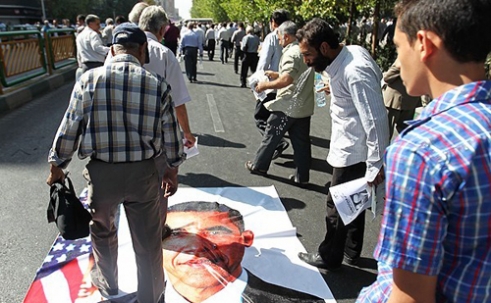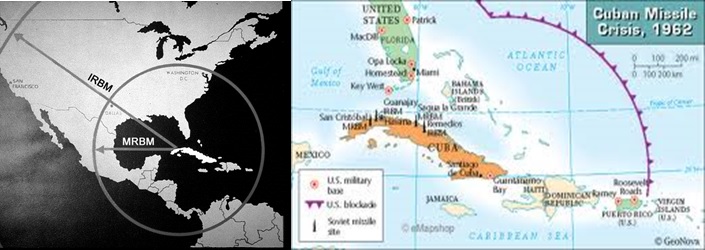Amb. Henry F. Cooper, Chairman . . . Lt. Gen. Daniel Graham, Founder
High Frontier . . Building Truly Effective Defenses . . Reagan’s Vision Lives
E-Mail Message 131008
Rouhani Rope-a-Dope and a Trip Down Memory Lane!
By Ambassador Henry F. Cooper
October 8, 2013
Last week, Iran’s President Hassan Rouhani pursued a “charm offensive” in New York including in his address to the United Nations General Assembly. Because he previously diverted interests in the West with seemingly cooperative initiatives while Iran continued enriching uranium, we should be skeptical of his promises not to build nuclear weapons and mate them to ballistic missiles that could reach Israel, our European allies and the United States. He wants the West to lift its sanctions on Iran—while we, and Israel, have insisted that Iran must not gain a nuclear weapons capability. Hopefully, U.S. and other Western leaders will not be taken in by Rouhani’s soft rhetoric. Stay tuned.
Mohamed Ali’s “rope-a-dope” strategy, used to defeat George Foreman for the Heavyweight Title by letting the ropes absorb much of energy from Foreman’s punches while counter-punching only enough to avoid having the referee stop the fight—Foreman tired, made mistakes and gave Ali an opening for a knockout. Seems like a fair metaphor for Iran and Iranian President Rouhani’s likely strategy in dealing with President Obama. As Senator John McCain noted, it worked like a charm for Russia’s President Putin to exploit Obama’s bluster and inept handling of Syria to gain the initiative in the Middle East, so why not for Russia’s other main ally in the Middle East—Iran, and Rouhani in particular?
The rope-a-dope continues for Syria—as much of the media hypes hopeful interactions with Syria’s chemical weapon stores. Seldom mentioned is that it early was noted that Syria provided information on its chemical weapons stores that did not square with U.S. estimates (previously shared as the basis for the new agreement brokered by Russia). Secretary of State John Kerry tries, with notoriety but little success, to add sound verification measures to Russia’s brokered agreement. While we await all the fine print, we should expect that Secretary Kerry’s “enforceable” verification objective likely is a figment of his imagination. Any notable improvement will have to be approved by the U.N. Security Council—where Russia and China can use their veto power to block any measure they don’t like—don’t hold your breath waiting for anything of note on that front.
Regarding Iran and its President—Hassan Rouhani, I could not agree more with Charles Krauthammer’s September 27th Washington Post article that presaged Rouhani’s “moderate” antics demonstrated during his charm offensive in New York City while visiting to address the United Nations General Assembly. I’m pleased that his excellent article notes many of the points of my emails: September 24—“Don’t Believe your Eyes,” June 18—“Hope for the Best and Prepare for the Worst” and August 13—“Definitely a Wolf in Sheep’s Clothing.” In one of his memorable phrases, Krauthammer wrote, “Such is their contempt for us that they don’t even hide their strategy: Spin the centrifuges while spinning the West.” And he shared a few more pertinent points that should inform those who hope for the best but believe we must prepare for the worst if we are to ever come close to achieving our objectives in the Middle East.
Implications from a Short Trip Down Memory Lane.
I first met Charles Krauthammer at Ambassador Max Kampelman’s home in Georgetown when I was Max’s Deputy and he led the Geneva Nuclear and Space Talks with the former Soviet Union. He, like Max, was—and may still be as far as I know—a defense minded Democrat after the mold of Washington’s Senator Scoop Jackson. (Actually, Max was Hubert Humphrey’s only staffer when he first came to town as Minnesota’s junior senator.) I’ve been among Charles’s admirers ever since, even on rare occasions when I have disagreed with him.
Many of Charles’ views on negotiating with adversaries are ones I shared with Max, my boss; and they helped guide our Geneva talks with the Soviets—which led to the first arms control agreements actually to reduce nuclear arms. We, in turn, were privileged to work for President Ronald Reagan, who also emphasized a few overarching principles—among them, that we should:
- Understand those with whom we negotiate—especially how they see the world from their point-of-view, and
- Be prepared to speak the truth to all in polite but unapologetic terms.
Under the first principle, Reagan understood Soviet strategic perspectives about which the preceding administration made hopeful but incorrect assumptions. Consequently, the first thing President Reagan did was to insure that we would negotiate from a position of strength. He rejected previous détente policies that had guided U.S. strategic thinking for years—noting memorably that his objective was that, “We win, they lose.” The preceding administration had hollowed-out our military while negotiating an unverifiable Strategic Arms Limitation Talks (SALT) Treaty that legitimized a massive Soviet build-up of nuclear arms while ours atrophied. (It was never ratified, since Reagan and many others on his team rejected it.) While ignoring much criticism from the liberal elite, Reagan withdrew from negotiations for a year, while initiating a major strategic modernization program, before beginning new Strategic Arms Reduction Talks (START) aimed at negotiating from a position of strength actually to reduce nuclear arms—not legitimizing a build-up as had been the result of previous mostly unverifiable treaties.
On the second principle, Reagan memorably overruled his diplomats in speaking the truth about and to the Soviets—for example in calling the Soviet Union the “evil empire” . . . which it definitely was . . . and later in Berlin challenging, “Mr. Gorbachev, tear down this wall!” His policies and loyal supporters at home and abroad were most pleased to see the breakup of the Soviet Union, which Russia’s President Vladimir Putin called the “greatest geopolitical disaster of the 20th century” . . . lest there be any doubt about his objectives today in the Middle East or elsewhere.
President Obama should note these principles—so far given short shrift by him and his negotiators. I want to mention just a few specifics.
With respect to our dealings with Russia, the Obama administration has regressed to a world in some ways like the one President Reagan inherited, with a so-called New START treaty that cut our strategic arms while legitimizing still increasing Russian nuclear arms, a modernization program reminiscent of the 1970s Soviet arms control world that Reagan inherited. In reality, it is a New SALT treaty, not a New START treaty—Reagan and his negotiators would not have produced such an unbalanced treaty. And President Obama’s promise, last Fall, of “flexibility” on missile defenses after being re-elected does not bode well for U.S. interests in current and future talks with Russia that could link U.S. concessions with things we want from Russia—e.g., including in the Middle East where our handling of Syria has left Putin in charge.
A complication in our dealings with Russia is that we should be confronting another “evil empire,” to use Reagan’s description of the Soviet Union as the then preeminent Communist power seeking world domination. We could and should use that same term to describe Islamic true believers who think that under sharia law which American Islamists see as preeminent even over the U.S. Constitution, that their mission is to reign supreme over all others in a global Caliphate—to impose their beliefs on all others by force if needed, potentially to kill them if they refuse to submit. In particular, this is the context for Iran’s mullahs calling Israel the “Little Satan” and America the “Great Satan,” and threatening to destroy both.
Oblivious to an Existential Threat?
The Obama administration seems to ignore these realities—to put it kindly. For example, the Director of National Intelligence absurdly testified that the Muslim Brotherhood in Egypt is a “largely secular organization, which has eschewed violence.” Try telling that to the Egyptians who threw out elected President Mohamed Morsi because he gave preeminence to the Brotherhood. Or consider the Brotherhood’s motto: “Allah is our objective. The Prophet is our leader. The Qur’an is our law. Jihad is our way. Dying in the way of Allah is our highest aspiration.”
The administration also has limited the flow of information about this Islamist threat to the front lines of those confronting it—whether on the battlefield, in diplomatic actions, or even within Washington’s halls of government. And many senators and representatives have ridiculed efforts of their colleagues to smoke out this poison within our ranks. For a comprehensive and referenced discussion of this threat, see the recent Gatestone Institute article by Claire Lopez, formerly a career operations officer with the Central Intelligence Agency, the conclusion of which is quoted below.
Bottom Lines for Iran.
We need to understand threats confronting us and speak the truth to power about them—especially as they mature and grow. While we still retain global power, not effectively countering “rope-a-dope” strategies being employed against us is a danger, especially re. Iran—we are not dealing effectively with its existential threat to all we hold dear.
Last week, Israeli Prime Minister Benjamin Netanyahu laid out his related concerns in a speech to the United Nations General Assembly—and, I am sure, in private to President Obama. They are entirely consistent with Charles Krauthammer’s—and mine. He made clear that Israel will do all in its power to prevent Iran from getting nuclear weapons—and urged that the international community—particularly the United States—should not be taken in by Iranian deceptions intended to persuade the West to reduce it sanctions on trade with Iran while continuing to reduce the time for an Iranian breakout capability to producing nuclear weapons—already within a period of months.
As Netanyahu noted, Iran has intercontinental range ballistic missiles (ICBMs) that can reach the United States—therefore, we should be as concerned as Israel about Iran getting nuclear weapons that could be mated to such missiles to attack us as well as Israel. As we have noted previously, Iran (and also North Korea) has also launched satellites capable of carrying nuclear weapons to attack any place on Earth—they head south, and on their initial passage over the United States could detonate a nuclear weapon and expose the entire continental U.S. to an EMP. Today, we are undefended against this threat.
In short, we should do what we can not to fall prey to Rouhani and other rope-a-dope maneuvers—not to mention those of Iran’s real leader—Rouhani’s boss, Ayatollah Ali Khamenei. Following Rouhani’s return from New York last week, Khamenei let everyone know on a state TV broadcast that “We support the government’s diplomatic moves including the New York trip because we have faith in them [Rouhani et al]. But some of what happened in New York was not appropriate” . . . presumably a reference to his 15 minute telephone call from President Obama in which Rouhani may have stepped over some line of concern. And Khamenei made clear that he did not trust Americans—that feeling is, or should be, mutual. Perhaps there’s a little “good cop, bad cop” going on here?
The next chapter in this saga is set to begin in earnest on October 15th when new negotiations on Iran’s nuclear program are set to begin. Then less than a month later on November 4th, Reza Kahlili reports in the Daily Caller that we should anticipate mass rallies shouting “Death to America.” This will be the 34th anniversary of the Iranian 1979 takeover of the U.S. embassy in Terhran. Brig. Gen. Seyyed Masoud Jazayeri, deputy chief of the Joint Armed Forces Headquarters, announced among other things that, “The crimes of leaders of America and international Zionism in their confrontation with the Iranian nation will never be erased from the public’s memory.”
Then Kahlili reports that at last Friday’s prayers, Mohammad Hossein Safar Harandi, a member of the Expediency Discernment Council of the regime, explicitly acknowledged that Rouhani’s new approach is only a tactical move and referred to the Sureh Al-Fath in the Quran: “God in the Sureh Al-Fath points to a condition which is similar to the current condition … a situation where the hand of the infidels and nonbelievers is restrained from the believers.” Harandi said that Allah sees engaging the U.S. as necessary to complete the “final victory” of Islam.
Peace in our time, right? Stay tuned for more rope-a-dope!
Message to Floridians on Iran’s Existential Threat.
Meanwhile the threat grows. Last week, I spent several days in the Florida Panhandle discussing an existential Iranain “threat from the south.” In addition to the above mentioned possible nuclear attack from a satellite coming from over the South Polar region, nuclear-armed ballistic missiles might be launched from vessels in the Gulf of Mexico to detonate their warheads high over the United States. They also could create an electromagnetic pulse (EMP) that could shut down a major portion if not all of the electric power grid. (My Florida trip was why I did not send out an email last week.)
At the University of West Florida in Pensacola, I spoke to faculty and students about the fact that we could be facing a crisis reminiscent of the Cuban Missile Crisis. (Click here to review my briefing charts.) Fifty-one years ago on October 21st, President Kennedy shared with the American people that the Soviet Union was deploying to Cuba nuclear weapons and ballistic missiles that could reach much of the United States. And in the following days we deployed a naval blockade as illustrated below to head off those Soviet ships, and happily the Soviets withdrew (and we withdrew our ballistic missiles from Turkey). What we did not know then was that the Soviets already had deployed a hundred or so nuclear weapons in Cuba. Castro wanted to keep them, Khrushchev refused and we avoided an even larger disaster than we understood was possible at the time.
The left side of the above chart shows the reach of medium-range ballistic missiles (MRBMs) and intermediate-range ballistic missiles (IRBMs) from Cuba—and also by simple deduction from anywhere they might be launched from a vessel off our coasts—in particular from the Gulf of Mexico. And Iran has actually tested ballistic missiles launched from vessels in the Caspian Sea in ways that suggest they are interested in creating a high altitude nuclear explosion—and an associated EMP.
And I repeated the story in my July 19 email report that last June, Panamanian authorities stopped in the Panama Canal a North Korean ship carrying a couple of SA-2 missiles, which could carry nuclear warheads into the Gulf of Mexico to execute such an attack—illustrating that this was not a hypothetical threat, today.
And What We Should Do.
I then briefed that we had an affordable means to defend against this threat, to which they are on the front line. We can deploy Aegis Ashore sites around the Gulf of Mexico—just like the sites we are deploying in Romania (by 2015) and Poland (by 2018) to protect our European friends from Iranian missiles. As we have discussed in previous email messages, no research and development money is required for this deployment—except perhaps to prepare specific site locations. I recommended two site locations in Florida, one on Tyndall AFB in Panama City and one at Homestead AFB near the southern tip of the Florida peninsula. During this trip, I also met with some key local authorities in the Panama City area and expect to follow up with them and also to initiate discussions with local authorities in the vicinity the Homestead AFB.
I noted that last year, we met with the local and state authorities in Mississippi to discuss deploying an Aegis Ashore site in Pascagoula where our Aegis ships are built—and know that Mississippians would welcome such a site there. Hopefully, the local authorities in Florida will also see the benefits. Next year, I intend that we will approach the local authorities in Corpus Christi, Texas where I think a fourth site would be appropriate to fill out a complete defense against ballistic missiles launched from vessels in the Gulf of Mexico. And hopefully, we will see the momentum build sufficiently for the powers that be to initiate the needed programs to build these sites as quickly as possible.
Such a deployment would build on the exceptionally impressive testing record of the Aegis system. Earlier this week saw the third successful test of the system in the last month, bringing its total record to 28 successful intercepts in 34 attempts against short, medium and intermediate range ballistic missiles—and if we include the 2008 intercept of a satellite, flying faster than an ICBM, its overall record in 29 intercepts in 35 attempts—all performed by operational crews.
Finally, I noted that no defense is perfect, and if a weapon gets through the defense to be detonated at high altitude, the resulting EMP could cause irreparable damage to the key large transformers of the electric power grid—and under certain well known conditions that could cause a complete failure of the electric power grid for an indefinite period. The ultimate result anticipated by credible experts could be that the consequent chaos would lead to the death of several hundred million Americans within the following year.
Thus, it is very important to harden the electric power grid to assure that we will not lose our electric power indefinitely. If we can accomplish this hardening of the electric power grid, then we will have a good chance of reinstating other critical infrastructure upon which our survival depends. Such hardening will also protect us against “Nature’s” EMP from solar storms. For a more complete summary of these issues, see our August 2nd email.
In addressing these concerns, it should be emphasized that the federal government’s first duty is to provide for the common defense. Providing effective missile defenses and hardening the electric power grid as quickly as possible should be a national priority.
High Frontier Plans.
We at High Frontier will continue to stick to our knitting, by seeking as quickly as we can to inform “the powers that be” of existential threats to the American people—as we have discussed in our emails for many months—and to urge them to “provide for the common defense” as charged by the Constitution they are sworn to uphold. Hopefully, key federal authorities and members of congress will soon begin to deal more effectively with the existential threat posed by natural and manmade electromagnetic pulse.
Key initiatives are to urge the Washington powers that be to undertake both the Shield Act and efforts to enhance our ballistic missile defenses, especially for our citizens on the East Coast and around the Gulf of Mexico, where they are completely vulnerable to ballistic missiles launched from vessels in the Gulf—or from Latin America, e.g., Venezuela.
But frankly, we have come to doubt that Washington will act in an expeditious way. Thus, we are also taking the message to grass roots America—as discussed above. Our local and state authorities need to understand these issues and what they might do if their federal representatives continue to fail “to provide for the common defense.” We sought to advise citizens and local authorities of their absolute vulnerability against ballistic missiles launched from the Gulf of Mexico—and what can be done about it if only their representatives do their jobs. And we are hopeful that the Florida state legislature will follow Maine’s initiative and harden the electric power grid in Florida, while holding the Washington authorities accountable for their oath to provide for the common defense. Hopefully, in joining such an effort, other states will be encouraged for follow them.
And what can you do?
Join us at High Frontier in seeking to alert the public and your local and state authorities to the existential threats posed by both man-made and natural EMP events—and what can be done about these threats.
We can use your help in spreading this information to the grass roots and to encourage all “powers that be” to provide for the common defense as they are sworn to do. Will you do your part?
Begin by passing this message to your friends and suggest they visit our webpage, www.highfrontier.org for more information. Also, please encourage your sphere of influence to sign up for our weekly e-newsletter!
Please click here to read Past Weekly Updates!
Please click here to read past Flash Messages!
Please help High Frontier continue this important and timely work!
Be sure to follow us on our Social Sites!
If you found this letter via our Social Sites, and you would like to subscribe, click below!









